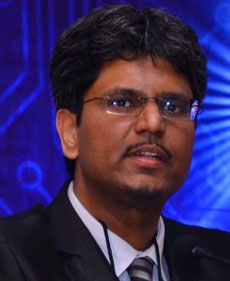
Next-Generation Network Security Training for IT Professionals
Learn the skills that matter! EC-Council's vendor-neutral network security certifications provide an unbiased approach to learning secure networking practices, as well as how to analyze and harden computing systems prevalent in the current IT infrastructure.
CND v2 has earned a reputation as the only program in the market that is 100% focused on network security and defense.
IT professionals need to be part of the cybersecurity ecosystem, especially in a post-COVID Digital Transformation era. If you think cybersecurity is the responsibility of cyber teams alone, think again!
Certified Network Defender v2 has been designed by industry experts to help IT Professionals play an active role in the Protection of digital business assets and Detection and Response to Cyber Threats, while leveraging Threat Intelligence to Predict them before they happen. CND is a network security course designed to help organizations create and deploy the most comprehensive network defense system.
The only program built for the world’s largest work-from-home experiment!
Studies and news reports had demonstrated that cyber attackers are quick to attack the new, unprotected threat surfaces created when millions of employees started working from home. Providing network security to such an unprecedented, distributed ecosystem in this post-pandemic world is every Network Defense Team’s acid test.
The Certified Network Defender v2 program has been upgraded and loaded with battle-ready ammunition to help Blue Teams defend and win the war against network breaches. Individuals and corporations looking to strengthen their Network Defense Skills will find CND v2 a must-have for 5 reasons:
- Only comprehensive network defense program built to incorporate critical secure network skills - Protect, Detect, Respond and Predict
- Maps to NICE 2.0 Framework
- Comes packed with the latest tools, technologies, and techniques
- Deploys a hands-on approach to learning
- Designed with an enhanced focus on Threat Prediction, Business Continuity and Disaster Recovery
Why Become A Certified Network Defender?
ANSI/ISO/IEC 17024 accredited
Certification Program
Mapped to the
NICE 2.0 framework
Covers the
latest tools, techniques, and methodologies
used by top cybersecurity experts around the world
The most practical network security and defense program ever — more than 50% of the course is lab-intensive to ensure application of real-world skills.
Who Should Go for Network Security Training?
Anyone can go for network security training, as long as they have:
- Basic computer literacy.
- Basic PC operating system navigation skills.
- Basic internet usage skills.
- Basic IP addressing knowledge.
- Computer security knowledge and skills.
The following individuals can consider EC-Council’s Network Security Certifications as the next move in their career:
- Cisco or Microsoft Certified Network Administrator/Engineers
- Wireshark Certified Network Analyst
- SolarWinds Certified Professional
- Juniper Certified Network Professional
- Professionals with Comptia’s Network+/Security+ Certification
- University professors who are teaching cybersecurity courses
- IT professionals planning a career transition
- Students who wish to start a career in cybersecurity
How CND v2 Will Build Your Career?
![]()
Your Pathway To A Career In A Blue Team
The Protect, Detect, Respond, and Predict approach defines the job roles for a Blue Team Security Professional. One can continue their career as a Network Defender or later transition into a niche job profile as CND v2 covers a base understanding of Blue Teams.
![]()
Mobile & Iot Security Defense
The first certification program to offer device and enterprise level security for its students. Career changers planning a move into cybersecurity will also benefit from this.
![]()
Tactical Defense Of Cloud Services
Learn different ways to ensure security across various cloud platforms — Amazon Web Services, Microsoft Azure Cloud, and Google Cloud Platform.
![]()
Learning Beyond Technical Aspects
CND v2 is the only certification program that offers a chance to learn beyond the technological aspects of network security. The module has a strong focus on the strategical domain with special attention to adaptive & defense in depth security, framing network policies, achieving compliance, and the operational domain to learn the implementation of the above decisions.
![]()
Building Perimeter Defense Skills
CND v2 puts the spotlight on perimeter defense as the latest technologies have made networks too complex for everyone. Perimeter defense can help with modern security requirements.
![]()
80 Complex Labs
The only program that gives a chance to students to learn under simulated threat environments and gain real-world skills before they start their professional career.
An Adaptive Security Strategy
CND is an adaptive security strategy built on a 4-pronged approach — Protect, Detect, Respond, and Predict. This approach not only proves effective in responding to a network attack but stops them before they happen.
Protect
- Defense-In-Depth Security
- Properly Designed, Implemented and Enforced Security Policies
- Security Architectures
- Appropriate Configuration
- Right Selection of Security Controls
Detect
- Traffic Monitoring
- Log Management
- Log Monitoring
- Anomalies Detection
Respond
- Incident Response
- Forensics Investigation
- Business Continuity (BC)
- Disaster Recovery (DR)
Predict
- Risk and Vulnerability Assessment
- Attack Surface Analysis
- Threat Intelligence
Duration
40 hours
Eligibility
- Basic computer literacy.
- Basic PC operating system navigation skills.
- Basic internet usage skills.
- Basic IP addressing knowledge.
- Computer security knowledge and skills.
Course Fees
Class Room Training
Rs.34,000/-
+ GST
Online Training
Rs.44,000/-Rs.34,000/-
+ GST
What You Will Get?
40 Hours
in-depth training by best faculties from network security industry
Study Materials
and examination voucher
CND
Certificate of Completion after examination and alumni status
Important Notice for International Students: The EC-Council global course fee and Exam Voucher fee will depend on the candidate's location and foreign currency exchange rate.
How You Will Benefit from CND v2
The end goal of Certified Network Defender (CND v2) is to help Blue Teams defend and win the war against network breaches in a post-pandemic world. The program is the ideal cyber defense course for organizations and individuals for the following reasons:
- Based on Common Job Role frameworks recognized by organizations around the world.
- ANSI/ISO/IEC 17024 accredited Certification Program.
- Mapped to the NICE 2.0 framework.
- Focuses on latest technologies including Cloud, IoT, Virtualization and Remote Worker Threats, Attack Surface Analysis, Threat Intelligence, Software Defined Networks (SDN), and Network Function Virtualization (NFV), as well as docker, Kubernetes, and container security.
- Covers the latest tools, techniques, and methodologies used by top cybersecurity experts around the world.
That's why investing in the CND v2 training and certification is a wise move for employers looking to set up impregnable cyber defense practices.
Course Details
What will you learn?
- Understanding network security management
- Establishing network security policies and procedures
- Windows and Linux security administration
- Setting up mobile and IoT device security
- Implementing data security techniques on networks
- Embedding virtualization technology security
- Determining cloud and wireless security
- Deploying and using risk assessment tools
- Learn basics of first response and forensics
- Understanding indicators of Compromise, Attack, and Exposures (IoC, IoA, IoE)
- Building threat intelligence capabilities
- Establishing and monitoring log management
- Implementing endpoint security
- Configuring optimum firewall solutions
- Understanding and using IDS/IPS technologies
- Establishing Network Authentication, Authorization, Accounting (AAA)
About the Exam
- Number of Questions: 100
- Test Duration: 4 Hours
- Test Format: Multiple Choice
- Test Delivery: ECC EXAM
- Exam Prefix: 312-38 (ECC EXAM)
Passing Score
In order to maintain the high integrity of our certification exams, EC-Council Exams are provided in multiple forms (i.e., different question banks). Each form is carefully analyzed through beta testing with an appropriate sample group under the guidance of a committee of subject matter experts. This approach ensures our exams offer academic difficulty, as well as “real world” applications. We also have a process to determine the difficulty rating of each question. The individual rating then contributes to an overall “Cut Score” for each exam form. To ensure each form adheres to assessment standards, Cut Scores are set on a “per exam form” basis. Depending on which exam form is challenged, Cut Scores can range from 60% to 85%.
Exam Eligibility Criteria
To be eligible to challenge the EC-Council CND certification examination, the candidate has two options:
Attend Official Network Security Training by EC-Council: If a candidate has completed an official EC-Council training either at an Accredited Training Center, via the iClass platform, or at an approved academic institution, the candidate is eligible to challenge the relevant EC-Council exam without going through the application process.
Attempt the Exam without Official EC-Council Training: In order to be considered for the EC-Council CND v2 exam without attending official network security training, the candidate must have at least 2 years of work experience in the Information Security domain. If the candidate has the required work experience, they can submit an eligibility application form along with USD 100.00, a non-refundable fee.
Hacking Tutorials
Read All Tutorials »
Building a career in Digital Forensic - How promising is the future? A thorough career guide
Read Details »Hacking Videos
Explore All Videos »How to Hiding Your Secret File using Steganography?
View On Youtube »Enroll Now
Fields marked with * are mandatory.
Ratings & Reviews
Boost Your Career In Network Security: Success Stories With CND
Job Prospects & Job Sources
According to LinkedIn’s 2020 Emerging Jobs Report, Network Defender jobs are in high demand — and have been for the last 3 years! Globally, Network Administrators and Engineers are adding significant value to their jobs and salary by learning critical network security and network defense skills.
Average earning of a Certified Ethical Hacker
Financially also this profession is paying and secure enough. In India on an average a certified ethical hacker earns an average salary of Rs 367,249 per year which increases with experience cumulatively upto more than 15 lakh per year.
Individuals who complete the CND v2 cybersecurity course qualify for the following entry-level job roles:
| Entry-level Network Administrators | Entry-level Network Security Administrators |
| Data Security Analyst | Junior Network Security Engineer |
| Junior Network Defense Technician | Security Analyst |
| Security Operator |
Network Security Engineer Salary
Professionals who complete a network security program with skills in IT Security & Infrastructure, Switches & Firewall Installation and Administration, and Network Security Management are correlated to above average pay, earning between $66,000 – $112,000 P.A.
The salary range depends on the job profile and experience. The further you progress, the more you’ll earn. The average network security engineer can earn $87,000 P.A. on an annual basis.

FAQs
- Module 01: Network Attacks and Defense Strategies
- Module 02: Administrative Network Security
- Module 03: Technical Network Security
- Module 04: Network Perimeter Security
- Module 05: Endpoint Security-Windows Systems
- Module 06: Endpoint Security-Linux Systems
- Module 07: Endpoint Security- Mobile Devices
- Module 08: Endpoint Security-IoT Devices
- Module 09: Administrative Application Security
- Module 10: Data Security
- Module 11: Enterprise Virtual Network Security
- Module 12: Enterprise Cloud Network Security
- Module 13: Enterprise Wireless Network Security
- Module 14: Network Traffic Monitoring and Analysis
- Module 15: Network Logs Monitoring and Analysis
- Module 16: Incident Response and Forensic Investigation
- Module 17: Business Continuity and Disaster Recovery
- Module 18: Risk Anticipation with Risk Management
- Module 19: Threat Assessment with Attack Surface Analysis
- Module 20: Threat Prediction with Cyber Threat Intelligence
40 hours
- Basic computer literacy.
- Basic PC operating system navigation skills.
- Basic internet usage skills.
- Basic IP addressing knowledge.
- Computer security knowledge and skills.
- Entry-level Network Administrators
- Entry-level Network Security Administrators
- Data Security Analyst
- Junior Network Security Engineer
- Junior Network Defense Technician
- Security Analyst
- Security Operator
After the course you can enroll yourself for CEH.
Member of:








